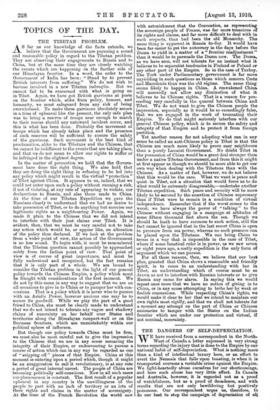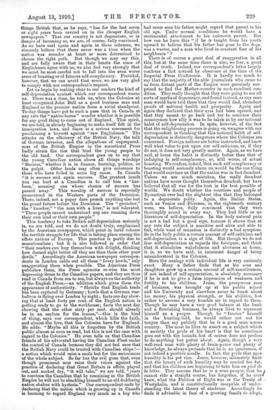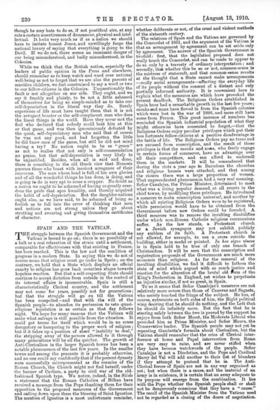THE DANGERS OF SELF-DEPRECIATION.
WE have received from a correspondent in the North. West of Canada a letter expressed in very strong terms regarding the injury that is done to the Empire by our national habit of self-depreciation. What is nothing more than a kind. of intellectual luxury here, or an effort to avert the Nemesis that falls upon boasting, is when it is transported overseas a veritable crime against the Empire. We light-heartedly abuse ourselves for our shortcomings, and here such abuse has very little effect. In Canada and Australia, however, it is regarded not as a proof of watchfulness, but as a proof of decadence, and with results that are not only bewildering but positively poisonous. Our correspondent urges us, therefore, to do, our best to stop the campaign of depreciation of all .things British that, as he says, "has for the last seven or eight years been carried on in the cheaper English newspapers." That our country is not degenerate, or in danger of becoming so, we are, of course, fully convinced. As we have said again and again in these columns, we sincerely believe that there never was a time when the nation was sounder at heart or more determined to choose the right path. But though we may say this, and are fully aware that in their hearts the mass of Englishmen agree with us, we also feel very strongly that we must be most careful not to fall into the even worse error of boasting or of fatuous sell-complacency. Provided, however, that we can avoid that error, we are very glad to comply with our correspondent's request. Let us begin by making clear to our readers the kind. of self-depreciation against which our correspondent warns us. There was a time, he tells us, when the Colonies at least recognised John Bull as a good. business man and England as the premier nation from a social standpoint. To-day things have got to such a pass that in Canada at any rate the " native-borns " wonder whether it is possible for any good thing to come out of England. This spirit, we are told, is already beginning to make itself felt in the immigration laws, and. there is a serious movement for proclaiming a boycott against "raw Englishmen." The attacks on the efficiency of the British Navy, the talk of German invasion, and the allegations of unprepared- ness of the British Empire in the sensational Press badly strain the ties that bind the young people to the old. land. Our correspondent goes on to say that the young Canadian nation above all things worships "Success," whether it is in finance, learning, politics, or the pulpit. Older lands may often give reverence to those who have failed in some big cause. In Canada "it is success and again success. The greatest insult you can hurl at a Canadian is to call him a has- been,' meaning one whose chance of success has passed away." This worship of success is especially pronounced in the Western parts of the Dominion. There, indeed, not a paper dare preach anything else but the grand future before the Dominion. The " groucher," the "knocker," "the man with a liver," is not tolerated. "These people cannot understand. any one running down their own land or their own people."
This tendency to take British self-depreciation seriously is, we are told, and we do not doubt truly, emphasised by the American newspapers, which paint in lurid colours the terrible struggle for life that is taking place among the effete nations of Europe. This practice is partly due to sensationalism ; but it is also followed in order that "their readers can hug themselves with delight, thinking how darned. sight better off they are than these other poor devils." Accordingly the American newspaper correspon- dents in London cable out all these "livery howls," only exaggerating them when possible. The American Press publishes them, the Press agencies re-wire the most , depressing items to the Canadian papers, and they are thus read in Canada from sea to sea, but always on the authority of the English Press,—an addition which gives them the appearance of authenticity. "Shrieks that English trade has been captured by Germany; howls that a German war- balloon is flying over London by night ; facts one day show- ing that at least forty per cent. of the English nation is getting ready to go to the workhouse ; facts the next day . showing that the other sixty per cent. should. already be in an asylum for the insane,"—this is the kind of thing, says our correspondent, which kills the faith, and almost the love, that the Colonies have for England.. He adds : "Maybe all this is forgotten by the British public almost as soon as read, but this is not the case with regard to the Colonies." He even tells us that Canadian friends of his advocated having the C-anadian Fleet under the control of Canada because they did not feel sure that the British Navy could be trusted with Canadian ships !- a notion which would raise a smile but for the seriousness .of the whole subject. So far has the evil gone that, even though prominent men raise their voices against the _practice of declaring that Great Britain is effete, played .out, and sucked dry, "it will take," we are told, "years to convince the Canadian that by remaining in the British Empire he will not be shackling himself to an old doddering nation shaken with hysteria." Our correspondent ends by declaring that the nation which is growing up in Canada 'is learning to regard England very• much as a boy who had never seen his father might regard that parent in his old age. Under normal conditions he would have a sentimental attachment to his unknown parent. But how can he have this "if he is taught from his youth upward to believe that his father has gone to the dogs, was a waster, and a man who lived in constant fear of his neighbours " ?
There is of course a great deal of exaggeration in all this, but at the same time there is also, we fear, a great deal of truth. Indeed, our correspondent's letter largely confu-ms a fact noticed by observers at the time of the Imperial Press Conference. It is hardly too much to say that the majority of the able journalists who came to us from distant parts of the Empire were genuinely sur- prised to find the Mother-country in such excellent con- dition. They really thought that they were going to see all sorts of marks of degeneracy, and found instead, as any sane man would have told them that they would find, abundant proofs of national health and. prosperity. Again and again they declared that their eyes had been opened, and that they meant to go back and try to convince their countrymen how silly it was to be taken in by our national habit of self-depreciation. In spite, however, of the fact that the enlightening process is going on, we agree with our correspondent in thinking that this national habit of self- depreciation is distinctly dangerous where the Colonies are concerned. Foreign nations are better instructed, and know well what value to put upon our self-criticism, or, if they do not, it does not very greatly matter. Again, as we have said, at home the habit is distinctly better than that of indulging in self-complacency, or, still worse, of actual boasting. We confess, indeed, that such self-complacency or boasting would seriously alarm us, would be the one thing that would convince us that the nation was in fact decadent. Unless we are much mistaken, the really decadent nations have never thought themselves decadent, but have believed that all was for the best in the best possible of worlds. We doubt whether the courtiers and people of Byzantium ever had the slightest idea that they belonged. to a degenerate polity. Again, the Italian States, such as Venice and Florence, in the eighteenth century were, we believe, fully convinced that they were thoroughly sound in every way. They had little or no literature of self-d.epreciation. In the body natural pain is not a bad but a good sign, because it shows that at any rate the subject is sensitive and alive and able to feel, while want of sensation is distinctly a bad symptom. So in the body politic a certain amount of self-criticism and self-depreciation is a sign of life. But though we do not fear self-depreciation as regards the foreigner, and think that it stimulates wakefulness and alertness at home, it is, as we have said, in imminent danger of being misunderstood in the Colonies.
Here the analogy with individual life is very curiously exact. Many a father finds that as his sons and daughters grow up a certain amount of self-assertiveness, if not indeed of self-appreciation, is absolutely necessary if he is not to give a false impression of weakness and futility to his children. Jones, the prosperous man of business, was brought up at his public school and. his University and elsewhere never to boast about his money, his physical strength, or his abilities, but rather to assume a very humble air in regard to them. Though he may have a very good balance at the bank and a flourishing business, he always likes to represent himself as a pauper. Though he " fancies " himself in the hunting-field, he would rather cut out his tongue than say publicly that he is a good man across country. The most be likes to assert on a subject which is secretly the pride of his heart is that he sometimes goes out with the hounds, but of course does not profess to do anything but potter about. Again, though a very well-read man with plenty of brain-power and plenty of knowledge he always pretends that he is an ignoramus, if not indeea positive noodle. In fact, the pride that apes humility is his pet vice. Jones, however, ultimately finds that the luxury of such humility may be carried too far, and that his children are beginning to take him au pied de la lettre. They assume that he is a semi-pauper, that he cannot ride a straight course, has forgotten, if he ever/ knew, what the Petition of Eight was or the Treaty of , Westphalia, and is constitutionally incapable of under- standing the latest theory of electrons. Accordingly he finds it advisable in face of a growing family to adopt, though he may hate to do se, if not pontifical airs, at any rate a certain assertiveness of demeanour, physical and intel- lectual. It looks very much as if as a nation we should have to imitate honest Jones, and unwillingly forgo the national luxury of saying that everything is going to the Devil. If we do not, there seems an imminent danger of our being misunderstood, and badly misunderstood, in the Colonies.
While we think that the British nation, especially the leaders of public opinion in the Press and elsewhere, should remember so to keep watch and ward over national well-being as not to forget that we are also the parents of sensitive children, we feel constrained to say a word or two to our fellow-citizens in the Colonies. Unquestionably the fault is not altogether on our side. They ought, and we say it frankly and plainly, to be not a little ashamed of themselves for being so simple-minded as to take our self-depreciation in the literal way they do. Surely experience of life must have taught them that it is not the arrogant boaster or the self-complacent man who does the finest things in the world. Have they never met the fool who declared that nobody could beat him at this or that game, and was then ignominiously defeated by the quiet, self-depreciatory man who said. that of course he was not any good, and had forgotten the little he did know once of the game, but still he did not mind having a try ? No nation ought to be so "green" as not to realise that not only is self-commendation no praise, but that self-depreciation is very likely to be unjustified. Besides, when all is said and done, there is something in the old Greek view that Nemesis pursues those who boast with insolent arrogance of their successes. The man whose head is full of his own glories and of all the wonderful things he has done, is doing, and is going te do is very apt to come a cropper. No doubt as a nation we ought to be ashamed of having so greatly over- done the pride that apes humility, and thereby acquired the habit of self-depreciation. But the daughter-nations ought also, as we have said, to be ashamed of being so foolish as to fall into the error of thinking that men and nations are not strong unless they go about strutting and swearing and giving themselves certificates of character.








































 Previous page
Previous page